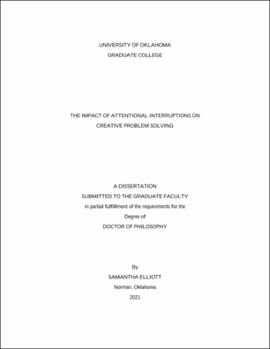| dc.description.abstract | Some scholars have found that a broad breadth of attention facilitates creative performance, whereas other researchers have found that it is best to have flexible attention based on the situation at hand and stage of the creative process one is in. These research discrepancies ultimately point to the inconclusiveness of findings within this scholarly literature. Moreover, many of the studies are fraught with methodological limitations, including unrealistic creativity tasks and constrained operationalizations of creative performance. The purpose of the present study was to address these issues by examining how different aspects of attentional interruptions impact creative problem-solving performance. Using a 2 × 2 × 2 between-subjects design with an additional control group, 216 undergraduate participants completed a creative problem-solving marketing task. Participants were asked to assume the role of a new marketing consultant at a failing soda company. Three email interruption manipulations (i.e., interruption timing, interruption amount, and interruption relevance) were embedded into the task and creative performance was measured by the quality, originality, and elegance of final marketing plans. Although none of the hypotheses were supported, exploratory findings point to the benefits of receiving a low number (e.g., two) of interruptions for creative problem-solving performance. The findings are discussed in terms of the need for future research that examines the interplay between attentional interruptions, cognitive load, and creative performance. | en_US |
